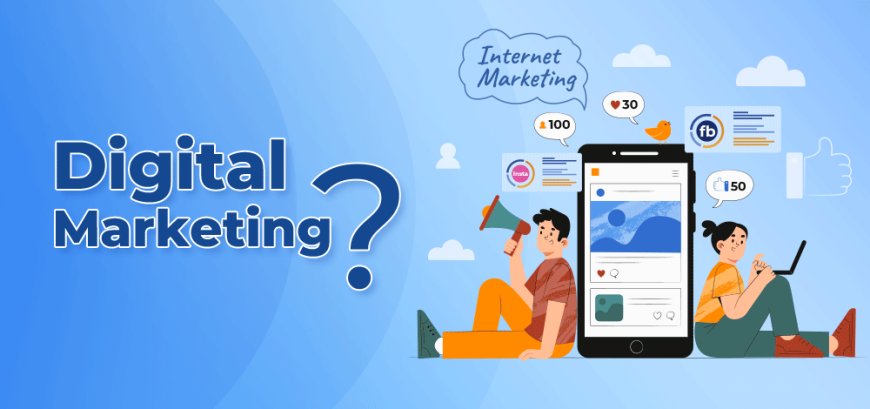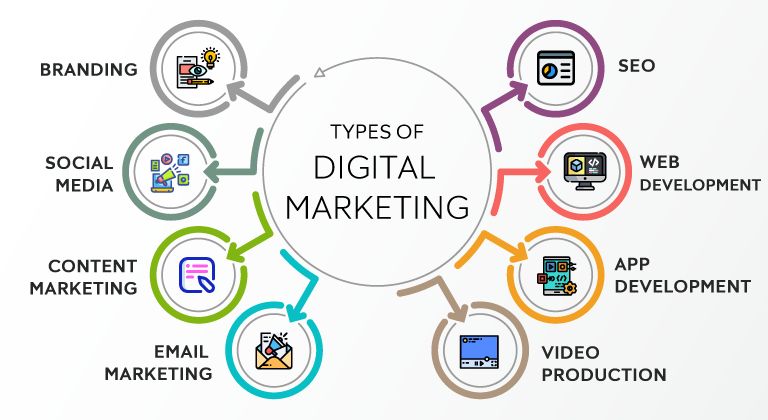Why is digital marketing important for business?
Discover why digital marketing is essential for business growth, helping reach target audiences, increase sales, and build brand awareness online.

Digital marketing is essential in the modern business setting, serving as a pillar of success. Its development has produced a strong foundation for raising brand awareness, encouraging client interaction, and propelling general business expansion. Digital marketing is vital in the modern fast-paced, technologically-driven world. It provides businesses looking for methods that work in the highly competitive market with doable options.
Accepting the Digital Transition for Business Pertinence
Using only conventional marketing techniques is insufficient to reach the vast online audience in the modern intensely competitive corporate world. The advent of digital technology has drastically altered things, necessitating that companies have a robust online presence. In an increasingly digital world, this change is essential for relevance and visibility—rather than a luxury. Firms must embrace this shift if they hope to successfully traverse the current market conditions.
Using Digital Evolution to Gain a Competitive Advantage
Without a strategic digital marketing approach, businesses risk being overshadowed by competitors who leverage the full potential of online channels. This complication highlights the need for businesses to adapt and embrace digital marketing methodologies.
So, why is digital marketing important for business?
In the modern company world, digital marketing is essential for success. It offers a worldwide audience, is economical, allows for targeted advertising, has quantifiable outcomes, and improves consumer interaction, which promotes brand expansion and loyalty.
Let’s take a look at each type in a little more depth.
1. Global Reach
Digital marketing breaks down geographical barriers, allowing businesses to connect with a global audience. Through platforms like social media, search engines, and email marketing, businesses can transcend borders and reach potential customers irrespective of their location.
2. Cost-Effective
Compared to traditional marketing, digital marketing offers a more cost-effective means of promotion. Online advertising, email campaigns, and social media marketing often require minimal investment but yield substantial returns, making it an attractive option for businesses with limited budgets.
3. Targeted Advertising
Digital marketing enables businesses to target specific demographics, ensuring that marketing efforts are directed towards the most relevant audience. This targeted approach not only enhances the effectiveness of campaigns but also optimizes resources by focusing on potential customers.
4. Measurable Results
One of the key advantages of digital marketing is its measurability. Analytics tools provide businesses with real-time insights into the performance of their campaigns, allowing for adjustments and improvements based on actual data rather than assumptions.
5. Enhanced Customer Engagement
Through social media platforms and interactive content, businesses can engage directly with their audience. This engagement fosters a sense of community, brand loyalty, and valuable feedback, creating a dynamic relationship between the business and its customers.
Digital marketing encompasses a diverse range of strategies and channels, each serving a specific purpose in reaching and engaging the target audience. Here's a breakdown of some key types of digital marketing
What are the different types of digital marketing?

1. Search Engine Optimization (SEO)
SEO involves optimizing a website's content and structure to rank higher in search engine results. By using relevant keywords and improving site accessibility, businesses aim to increase organic traffic and enhance their online visibility.
2. Search Engine Marketing (SEM) or Pay-Per-Click (PPC)
SEM involves paid advertising to appear at the top of search engine results. Businesses bid on keywords, and they pay when users click on their ads. This method provides immediate visibility and can be highly effective for specific campaigns.
3. Social Media Marketing
Social media platforms like Facebook, Instagram, Twitter, and LinkedIn offer powerful channels for businesses to connect with their audience. Social media marketing involves creating and sharing content to engage followers, build brand awareness, and drive website traffic.
4. Content Marketing
Content marketing focuses on creating and distributing valuable, relevant content to attract and retain a target audience. Blog posts, articles, videos, and infographics are examples of content that can establish a brand as an authority in its industry and drive organic traffic.
5. Email Marketing
Email marketing remains a potent tool for direct communication with customers. It involves sending targeted messages, newsletters, or promotional content to a subscriber list. Personalized and well-timed emails can nurture leads and encourage customer loyalty.
7. Influencer Marketing
Leveraging the influence of individuals with a significant online following, influencer marketing involves partnering with influencers to promote products or services. This type of marketing capitalizes on the trust influencers have built with their audience.
8. Video Marketing
With the rise of platforms like YouTube and TikTok, video marketing has gained prominence. Businesses create engaging video content to showcase products, share behind-the-scenes glimpses, or provide informative and entertaining material to connect with their audience visually.
Why digital marketing is important for business
In contemporary business digital marketing plays a pivotal role in shaping the success and sustainability of enterprises. Its importance can be attributed to various factors that collectively contribute to the growth and visibility of a business. Firstly, the global reach afforded by digital marketing transcends geographical limitations, enabling businesses to connect with a diverse audience on a worldwide scale. This expansive reach is complemented by the cost-effectiveness of digital marketing, offering businesses, especially those with limited budgets, an affordable avenue for promotion.
Digital marketing allows for precise targeting, ensuring that promotional efforts are directed at specific demographics most likely to engage with the brand. The ability to measure results in real-time through analytics tools sets digital marketing apart, providing businesses with valuable insights into the effectiveness of their strategies. The interactive nature of digital platforms fosters enhanced customer engagement, creating a dynamic relationship that goes beyond the transactional.
The importance of digital marketing lies in its adaptability to the evolving preferences of the modern consumer. As businesses strive for relevance and visibility in an increasingly digitized world, embracing digital marketing strategies becomes not just a choice but a strategic imperative for sustained growth and competitive advantage.
Digital marketing is the linchpin for contemporary business success. Its global reach, cost-effectiveness, targeted advertising, measurable results, and enhanced customer engagement collectively drive brand growth. Embracing diverse digital strategies, from SEO to influencer marketing, businesses gain a competitive edge in the dynamic online landscape. In the digital era, adopting these methodologies is not just advantageous; it's a necessity for sustained relevance and prosperity.






























































